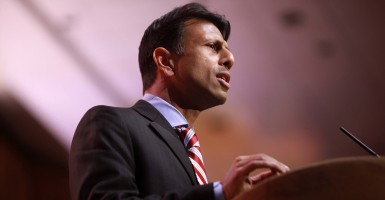We have some idea from his two terms as governor of Louisiana what Bobby Jindal, perspective 2016 presidential candidate, would do domestically in the Oval Office. But we found out on Monday that when it comes to foreign and defense policy, Jindal would pursue a track a lot more like that of Ronald Reagan than Barack Obama.
Three changes would be most noticeable:
1. We would not lead from behind in a Jindal administration. Jindal told an audience at the American Enterprise Institute on Monday that President Obama consistently attacks the idea of American exceptionalism under the guise that all systems of government and values are essentially equal, which has left our allies feeling abandoned and our enemies emboldened. He said America again must stand tall in its unique role as world leader.
Unlike some other nations, Jindal said, America pursues its objectives “in a defensive and benign way” that encourages nations the world over to resolve differences peacefully.
2. We would not shrink from the use of hard power when necessary. Jindal called the “tools of hard power” the “indispensable element that underpins the other tools” and the “ultimate foundation of international credibility.” He said the Obama administration has allowed these tools to fall “into disrepair” at “a time of multiplying threats, when the technology of ‘asymmetric weaponry’ is spreading and the ability of non-state actors to inflict terrible destruction on innocent citizens is only increasing.”
3. We would meet new defense challenges with a military that is smarter, faster, more agile and more efficient with the dollars American taxpayers provide. Jindal said defense budgets went up after 9/11, but most of that money went to the war on terror, leaving military modernization programs stagnant.
The bipartisan National Defense Panel unanimously called for a defense budget that would make modernization possible, Jindal said. But President Obama instead has hollowed out the military, leaving a Navy that soon will have 100 fewer ships than China, an Air Force that will have the smallest fleet of planes since its inception, and an Army whose end strength will be its smallest since World War II.
American security will be compromised unless the latest National Defense Panel’s recommendations are taken seriously, he said.
At the same time, he said, other priorities mean efficiency as well as defense and must be upgraded. “Funding must be smarter – not motivated by domestic political priorities, but by what real threats America faces around the world,” he said. “We must return to the 2011 budget proposed by Secretary Gates.”
That was the last time the Department of Defense released a budget request based on real threat analysis and military requirements.
Defense spending, he said, is the first priority of the government and must be adequately funded first and foremost. And, to his credit, he laid out a simple and comprehensive plan for doing so.
































